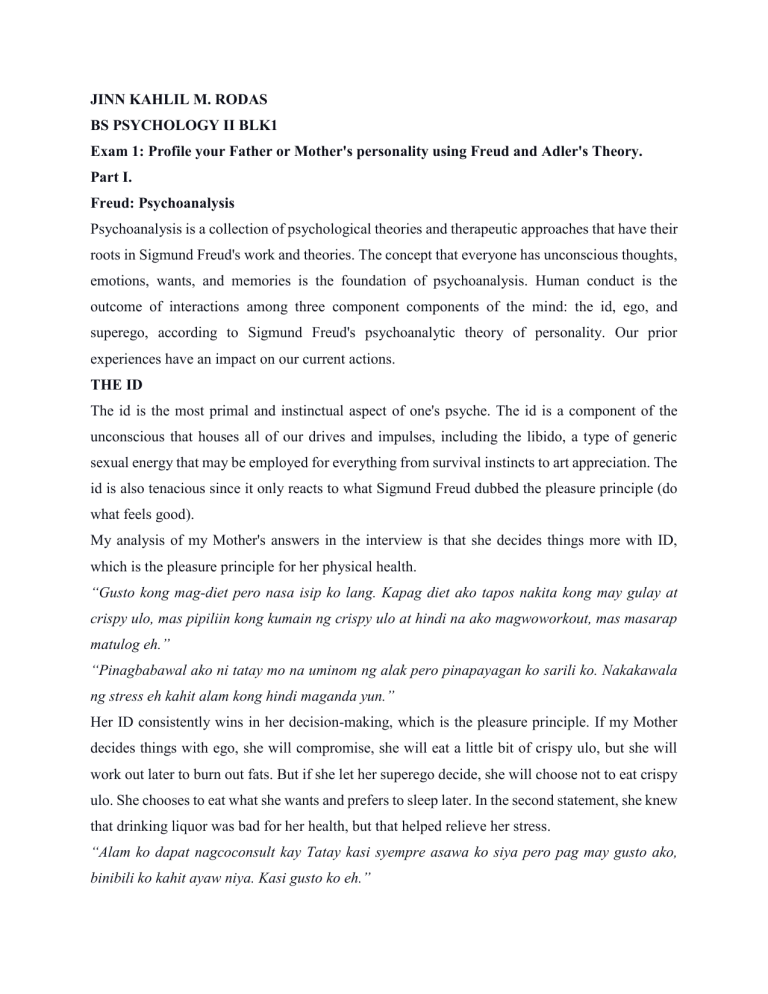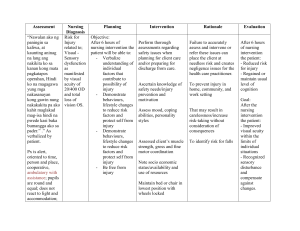
JINN KAHLIL M. RODAS BS PSYCHOLOGY II BLK1 Exam 1: Profile your Father or Mother's personality using Freud and Adler's Theory. Part I. Freud: Psychoanalysis Psychoanalysis is a collection of psychological theories and therapeutic approaches that have their roots in Sigmund Freud's work and theories. The concept that everyone has unconscious thoughts, emotions, wants, and memories is the foundation of psychoanalysis. Human conduct is the outcome of interactions among three component components of the mind: the id, ego, and superego, according to Sigmund Freud's psychoanalytic theory of personality. Our prior experiences have an impact on our current actions. THE ID The id is the most primal and instinctual aspect of one's psyche. The id is a component of the unconscious that houses all of our drives and impulses, including the libido, a type of generic sexual energy that may be employed for everything from survival instincts to art appreciation. The id is also tenacious since it only reacts to what Sigmund Freud dubbed the pleasure principle (do what feels good). My analysis of my Mother's answers in the interview is that she decides things more with ID, which is the pleasure principle for her physical health. “Gusto kong mag-diet pero nasa isip ko lang. Kapag diet ako tapos nakita kong may gulay at crispy ulo, mas pipiliin kong kumain ng crispy ulo at hindi na ako magwoworkout, mas masarap matulog eh.” “Pinagbabawal ako ni tatay mo na uminom ng alak pero pinapayagan ko sarili ko. Nakakawala ng stress eh kahit alam kong hindi maganda yun.” Her ID consistently wins in her decision-making, which is the pleasure principle. If my Mother decides things with ego, she will compromise, she will eat a little bit of crispy ulo, but she will work out later to burn out fats. But if she let her superego decide, she will choose not to eat crispy ulo. She chooses to eat what she wants and prefers to sleep later. In the second statement, she knew that drinking liquor was bad for her health, but that helped relieve her stress. “Alam ko dapat nagcoconsult kay Tatay kasi syempre asawa ko siya pero pag may gusto ako, binibili ko kahit ayaw niya. Kasi gusto ko eh.” Aside from her physical health, she decides things impulsively when it comes to what she wants. Even if the thing she bought is not necessary, she does not have regrets as long as it made her happy. THE EGO The ego follows the realism principle, figuring out practical methods to meet the desires, d's typically sacrificing or deferring gratification to avoid unfavorable societal repercussions. When selecting how to act, the ego analyzes societal reality and standards and etiquette and laws. “Kapag naman nagdedecide ako, halimbawa travel eh pinag-uusapan naming yan ni Tatay. Kapag hindi niya ako pinayagan, laging may deal halimbawa may isasama ako sainyong magkakapatid or kaya next month na lang basta matutuloy pa rin siya sa time na pinag-usapan namin.” My Mother stated that whenever she wants something, especially if that costs a lot, she asks for my Father's permission because it was a big decision. She knows how to compromise when it comes to big decisions. She is willing to adjust according to my Father's rules simultaneously; she will get what she wants (the pleasure). Using my observation throughout the years, my Mother is good with people. She loves to go party, but of course, she needs to ask her employees and sales agent. One of the biggest parts is asking her boss for the budget. If her boss gave her the budget, she would make a party enough for the budget and with her workers' requests. She received the party she wanted (which is the pleasure), and she decided to make these things work with the standard of her workers and her boss (societal reality standards). THE SUPEREGO The superego is a part of the unconscious that is the source of self-criticism and the voice of conscience (doing what is right). The superego contains many codes, or prohibitions, that are issued mostly unconsciously in the form of commands or "don't" statements. It reflects society's moral values to some extent, and a person is sometimes aware of their own morality and ethics, but the superego contains a vast number of codes, or prohibitions, that are issued mostly unconsciously in the form of commands or "don't" statements. “Kapag may nag-sorry sa akin, kahit nga hindi nagsosorry eh pinapatawad ko na lang. Masama kasing magtanim ng sama ng loob. Huwag kang magtatanim ng galit dahil wala naming perpekto” My Mother thinks that getting mad at someone who hurt her or anyone is not a good thing. Even though the person who did something wrong to her never asked for forgiveness, she is willing to forgive them. She thinks that getting mad for a long time is bad because not everyone is perfect. Her “don’t statement” is “huwag magtanim ng galit”. Whenever she gets mad at someone, she will later realize that it is not right to get mad; she criticizes herself as lucky because she could understand them. KINDS OF ANXIETY Neurotic Anxiety (ID) The fear that we shall lose control of our desires, id's results in punishment for the wrong action. A dread of punishment throughout childhood often accompanies these hostility sentiments, and this fear eventually gets generalized into unconscious neurotic anxiety. “Noong medyo bata ka pa ay alam kong sinabihan kita na masyado kang matapang na magcriticize sa Politics eh hindi ka pa naman botante. Alam kong mali yun pero sinabi ko pa rin dahil natatakot ako.” She feels uncomfortable about me being an activist because my Father was red-tagged, and it came to the point where we need to change our last name in our social media. She was anxious that I might be in danger. As a result, she told me wrong things as her response to her fear. Moral Anxiety (Ego) Moral anxiety arises from the fear that one's internalized ideals are going to be compromised. Selfpunishment (e.g., guilt) is feared as a result of going against one's principles. Moral anxiety is a result of the superego's growth. Whatever the source of worry, the ego strives to alleviate it. “kapag may umutang sa akin tapos hindi nagbayad sa pinangakong oras, pinipigilan kong magalit. Kasi iniisip ko swerte naman ako eh tapos laging sinasabi ni Brother A na “Ang Diyos ay pag-ibig” kaya dapat maging understanding” My Mother thinks that getting mad at someone who cannot pay for debt is bad. Before she gets mad, “Ang Diyos ay pag-ibig” always comes in her mind. She feels like getting mad makes her bad because she should consider herself lucky because God blessed her. Realistic Anxiety (Ego) Anxiety as a result of a known threat or risk. In the actual world, this form of worry is considered a typical reaction to risk, and it helps to mobilize resources to defend the person from danger. It's also known as objective anxiousness. “Ako, I am campaigning for Leni dahil natatakot ako para sa future n’yo at sa future nating lahat. I want people to vote for the right.” My Mother feels anxious about what will happen to our country if someone who is not capable will win as the President. She was campaigning for Leni as a result of her anxiety because she wants to save our future. The result of her fear was to use her voice to fight for humanity and to ask people to vote who she think is capable of saving our future. Only the ego can feel the anxiety and the ego will do everything to resolve it. If the ego was not able to find the solution, the ego will find it hard and will use Defense Mechanisms instead. Defense Mechanisms Defense mechanisms are automatically utilized psychological methods that prevent a person from anxiety caused by unwanted thoughts or sensations. According to Freudian theory, defense mechanisms constitute a distortion of reality in women so that we are better equipped to deal with a circumstance. Repression Forcing emotions, impulses, or memories into the unconscious to successfully forget them to reduce anxiety. “kapag nasa ibang bahay ako or kapag nasa travel ako, hindi ako nakakadumi sa CR kahit kailangan na. Tapos kapag nasa kwarto si Tatay kelangan lalabas muna siya ng kwarto para makadumi ako.” My Mother feels uncomfortable using the comfort room except at home. Unconsciously, she feels like someone always peeks at her whenever she uses someone's bathroom. This is the result of her repressing her traumatic experience. When she was young, an older man looked inside the comfort room while she was in the process of moving her bowels. Displacement Displacement is a psychological defense mechanism in which a person focuses a bad feeling away from its source and onto a less dangerous receiver. Displaced aggressiveness is a typical form of defense. “Kapag nagsasalita ako kapag hindi ko nakukuha yung gusto ko, nadadamay kayo noon halimbawa ay hindi kayo nagdayag agad, nagagalit na ako sainyong lahat tapos hindi ko na kayo iimikan.” My Mother gets mad whenever we do not follow her favor; she gets angry at all the people in our house. She chooses not to speak at all; her displacement is "silent treatment" to all. “One time nagalit ako kasi nag-away kami ng Tita mo, binato ko phone ko ayun nabasag” When she and her sibling got into a fight, she could not show her anger. As her displacement in her anger, she threw her phone. Sublimation Sublimation is a mature defense mechanism in which socially unwanted impulses or idealizations are changed into socially acceptable behaviors or behavior, perhaps leading to a long-term conversion of the underlying drive. “Kapag nagagalit o nasasaktan ako before, sinusulat ko na lang sa diary yung nararamdam ko para atleast mailabas ko yung galit na nafifeel ko.” My Mother used a diary to express her anger or sadness which is an example of sublimation. ADLER: INDIVIDUAL PSYCHOLOGY The role of inferiority and superiority in life is determined by early interactions with family members, peers, and adults. Birth order, according to Adler, has a major and predictable influence on a child's personality and feelings of inferiority. All human activity is goal-oriented and driven by a desire to be better than others. Individuals have different objectives and approaches to achieving them. As soon as they begin to encounter the world, all newborn suffer feelings of inferiority and inadequacy. The child's unconscious, fictive aspirations are shaped by these early experiences, such as the drive to attract the parents' attention. They instill in the child a desire to overcome his or her inadequacy – a desire to compensate for weaknesses by enhancing other abilities. Main Tenets of Individual Psychology 1. People strive in superiority 2. People's actions and personalities are shaped by their subjective perceptions. Ex. My Mother's perception is that her parents' attention was on her because she quickly get sick. In contrast, her middle child sibling perception is that she is the favorite child. The parents' perception is that what they do is just normal, but my Mother's siblings have different interpretations of how their parents treat them. 1. Personality is self-consistent and unified. Ex. My Mother's goal is to help her siblings after she graduates. Her goal is to be the responsible eldest child. She wants to help her family as she is the first child to graduate. Her goal is consistent because even though her siblings have their own family already, she still helps them when they need her. 1. A person's self-consistent personality evolves into a life-style shaped by creative power. “Masaya ako sa work ko ngayon kasi nagkaroon ng trabaho yung mga dating house wife. Mahal nila ako kasi mabuti ako sakanila, kahit ako yung pinaka-boss hindi ako controlling.” Ex. My Mother said that her siblings respect her so much that they always consult her when it comes to big decision-making. She rules her siblings but not to the point that she controls them; she always wants the best for them. Her personality as the eldest child shapes her lifestyle significantly in her work. Since her goal when she was young was to help her siblings, helping the people who do not have work is the effect of her consistency. She became a good leader. FINAL GOAL Success of Humanity- Adler said that a person who grew up in a loving and supportive family will have a clear goal. He believes that a person with a clear goal thinks that they are successful if the people around them are successful as well. “Lumaki naman akong kasama ko ang magulang ko at binibigay naman nila lahat ng kailangan namin.” My Mother's goal is to help the people, not just provide for her selfish desires. She did not grow up as a controlling leader but a leader who knows how to listen to her people. Whenever her sales agents need something, she is one call away. She treats them with respect and acts like one of them. 1. All human activity must be seen from the perspective of Social Interest. If we have a social interest, our final goal is clear. If our final goal is clear, we can resolve any problem that we can encounter. “Nung nagka-covid tayo lahat dito sa bahay, hindi ko pinakitang nahihirapan ako at nagpapanic, gumawa na lang ako agad ng solusyon.” “Kapag may mga nagrereklamong client, ineexplain ko lahat in a good manner and nagpepresent lang ng facts.” Whenever my Mother encounters problems, she is always calm and thinks of how to resolve it. She was very thorough in resolving problems and she never fails to prevent them. This proves that my Mother has a clear goals ever since. Family Constellation The phrase "family constellation" was developed by Adler to describe the functioning of the family system, which includes parents, siblings, and other members of the person's biological family and any people living with them as members of the person's childhood home. Birth has a significant effect in the subjective perception of a person. Adler believes that a typical pattern developed among siblings because of the timing and circumstances during birth. “Palaging sinasabi ni Tachie mo na ako ang paborito na lahat binibigay sa akin tapos ako yung palaging inuuna.” My Mother is the eldest child, so that means that she is the family's first child. Since she is the family's first child, her parents are excited to have her. Her parents were still learning when she was born, so all the attention was on her. My Mother gets sick quickly as well. That is why her parents are afraid that they will do something wrong. The effect of these things to her sibling, the middle child, is that she was the favorite, and the middle child is the neglected child. At the same time, the excitement returned to the last child because they believed they needed to shower the love to the last child. FIRSTBORNS According to Adler, firstborns are most likely to become: Natural leader- my Mother leads her siblings most of the time. She said that when it comes to making a decision, her siblings consult her first. When it comes to her work, despite being surrounded by people older than her, she could lead them without making them feel she was superior. She was good at handling problems that her boss trusted her so much. High Achiever- my Mother is a consistent honor student during her childhood. She said that this is one of the reasons why her parents give her more attention than her siblings. Even at work, she is one of the best real estate broker. Organized- my Mother hates disorganized things. That is why we fight most of the time. She has obsessive-compulsive; she gets mad whenever her organized plan is unsuccessful. When it comes to working, she organized the rules and regulations of the company. Know-it-all- my Mother corrects our grammar most of the time. She told me that even her cousins were asking for help when it comes to academics because she knows everything. Even if something is unfamiliar, she will do everything to find a solution. Bossy- my Mother loves to boss around but not in a dictator manner. Obeys the rules- obeying rules is also connected to Organized. My Mother gets mad whenever we do not follow the rules. For example, she told us to go home at 10 pm, but I got home at 12 am. She will get mad because she believes that rules should be obeyed. Conclusion: My Mother has a clear goal despite experiencing trauma growing up; she survived these things because her husband (my Father) helped her get through this. She was able to contribute good things to society. She gives work to the people in need, provides time if her siblings need her, and helps her friends even if that is financial. Despite her being the eldest child of the family, she made us feel that she treated us fairly. She gives everything we need and wants despite not leaving anything for herself. When it comes to politics, she is a good citizen because she criticizes the leader's wrongdoings. She presented facts to the victims of misinformation; she educated them than making them feel she was brilliant. Like what Adler said, eldest children are natural leaders, so is my Mother. Exam 2: Analyze yourself through Jung's Personality theory. II. ANALYTICAL PSYCHOLOGY It is distinguished by an emphasis on the importance of symbolic experiences in human existence and a forward-thinking approach to therapy issues. This indicates that, although one's past history is important for understanding one's present situation, one's current situation also contains the seeds for future growth and development. Individualization is the purpose of Jungian analysis, as defined by Jung. Individuation is the attainment of a higher level of awareness of a person's whole psychological, interpersonal, and cultural experiences. Jung, like Freud, acknowledged the significance of early life experiences, as well as the psychological complexes that result from life difficulties, all of which are stored in the personal unconscious. The collective unconscious is made up of these variables, which he refers to as archetypes, and they give shape to the more universal tales, myths, and religious events that create the greater framework of human experience. The goal of the analytic process is to bring these aspects into awareness, both personal and collective, so that the individual may understand more clearly what forces are at work in his or her life. Levels of Psyche Conscious It is here where the ego dwells. Jung's ego, unlike Freud's, is not the core of personality. Personality Attitudes and Functions Introversion- a personality trait characterized by a sense of direction in life-based on subjective psychic contents Extraversion-The focus of attention on the external object characterizes this attitude. I call myself an introvert, but Jung believed that people are both introverts and extroverts. Jung believes that there are eight personality types: Introvert Feeling, Introvert Thinking, Introvert Sensing, Introvert Intuiting, Extrovert Feeling, Extrovert Thinking, Extrovert Sensing Extrovert Intuiting. The most ideal is to develop four Personality Types. If we develop four, we are considered as well-rounded as a person. It will not be hard for us to face situations in our lives. In short, we are psychologically healthy. I can say that I am mentally stable because I developed four of these personalities. Extraverted Thinking relies on facts and reasoning rather than emotions and values to make decisions. Extraverted Thinkers can put their feelings aside to separate the objective facts from their feelings. I can see myself as an extraverted thinker because I never let my emotions affect my decision-making. The people around me always call me calm because whenever there are problems, I never show them that I am worried. Instead, I am thinking objectively about how I can resolve the issues. Whenever people are spreading false information, I attack them with facts, even if they attack me personally. I always put aside my emotions because I believe that letting your emotions to decide will make a mess. My thinking is fact-based style. Extraverted Intuition Extraverted Within a pool of ideas, facts, or experiences, intuition searches for correlations or patterns. People's attention is drawn to the external world's realities. I can see myself as an Extroverted thinker because I care more about society, history, and patterns than my own subjective beliefs. I do not want to vote for Bongbong Marcos for President because of the ways she does not respect the time of the people, for example, if he was absent in the Presidential interview. If he is not responsible with time, how can he be responsible President? My attention relies on external world facts that the Philippines needs a leader who accept criticism. I want the best for the country despite of the danger. Introverted Sensing is an information-gathering (perceiving) function. It compares and contrasts new experiences with prior experiences and memories, focusing on the subjective, internal realm of human experience. Patterns tend to repeat themselves, and they are quick to recognize changes or irregularities in their surroundings. They put their faith in personal experience and investigate the influence of current events, actions, and outcomes subjectively. I can see that I am more introverted in sensing because I believe in my own experience most of the time but not to the point that I do not respect facts and other people's opinions. I believe that we have different experiences. It was easier for me to recognize wrong things using patterns. For example, when I used to be in a relationship with same-sex, I viewed every same-sex relationship as full of jealousy and toxicity. Because every time I enter a same-sex relationship, whenever I hang out with my friends, they get jealous. But that does not mean that people in a same-sex relationship are toxic; that is just my own viewpoint because of my experience. Whenever I sense something familiar, I always prevent or end it. Extraverted Feeling is often referred to as the "harmonizing" function. This is because it allows us to comprehend and sympathize with other people's moods and feelings. People with strong extraverted feelings can absorb other people's emotions and experience them as their own. My friends told me that they want to seek advice because they always find a connection to me. Whenever I talk to someone, I always put myself in their shoes. Even if some people find their actions unreasonable, I always reason to understand them. Whenever someone is crying, I feel like crying as well. I used to be self-centered but taking psychology taught me to understand every individual. It was needed especially; I have learned how to therapy people. Aside from these personalities, Jung believes that there are two types of the unconscious. The Personal Unconscious and the Collective Unconscious. Repressed memories, emotions, and concepts from our own prior experiences are stored in the Personal Unconscious. We call complex experiences, which are a jumble of emotionally charged thoughts. Complexes are unique to each individual since they are based on personal experience. One of my personal unconscious is that my Father is my standard for man. My Father is a loving man; he gives everything to his family, he is smart, he loves to read, sing and play instruments. I thought all fathers could sing just like my Father when I was young. Unconsciously, my Father became my standard when looking for a man. Our ancestors' memories and experiences are stored in the collective unconscious. Our distant ancestors' experiences with God, Earth, Father, Mother, and other concepts may be handed down from generation to generation. These distant recollections influence our attitude and personality. This is what we call Archetypes. Archetypes are already ingrained in us. It was as though we had a program put in our heads. However, these archetypes are not active; we must have experiences linked to these archetypes in order for them to be activated. The mask we wear in public is our persona, which is the part of our personality that we let others see. In social connections, a persona gives some regularity. My persona is that I am a formal and cold person. That is why people view me as an intelligent person who knows everything. But behind that persona is a person who strives more challenging to know everything. I always ask myself as a tough person, but deep inside, I am sensitive. I doubt my own abilities. Although shadow is a natural aspect of human beings, the great majority of us choose to remain ignorant to its presence. We conceal our flaws, not just from others but also from ourselves. To do so, we often criticize and blame others for diverting attention away from our flaws and destructive inclinations. My shadow is that I am afraid to fail; I always want all things to be perfect, which is impossible. I am always anxious about everything I do because I always want it to be the best. I am impatient because I want to achieve things at my phase. Most of the time, I act like I am always right. I cannot accept that shadow. The animus is the male side of females. The people around me are always telling me that my masculine personality is more dominant than my feminine personality. I am not aware of it unless they tell me. I enjoy things that men usually do, for example, things that need physical strength. Conclusion: Self- Realization The plan is to bring all archetypes together to accomplish individuation. We may build the archetypes of all archetypes, which is "The Self," if we unite all archetypes. Only a few handfuls are capable of completing them.






